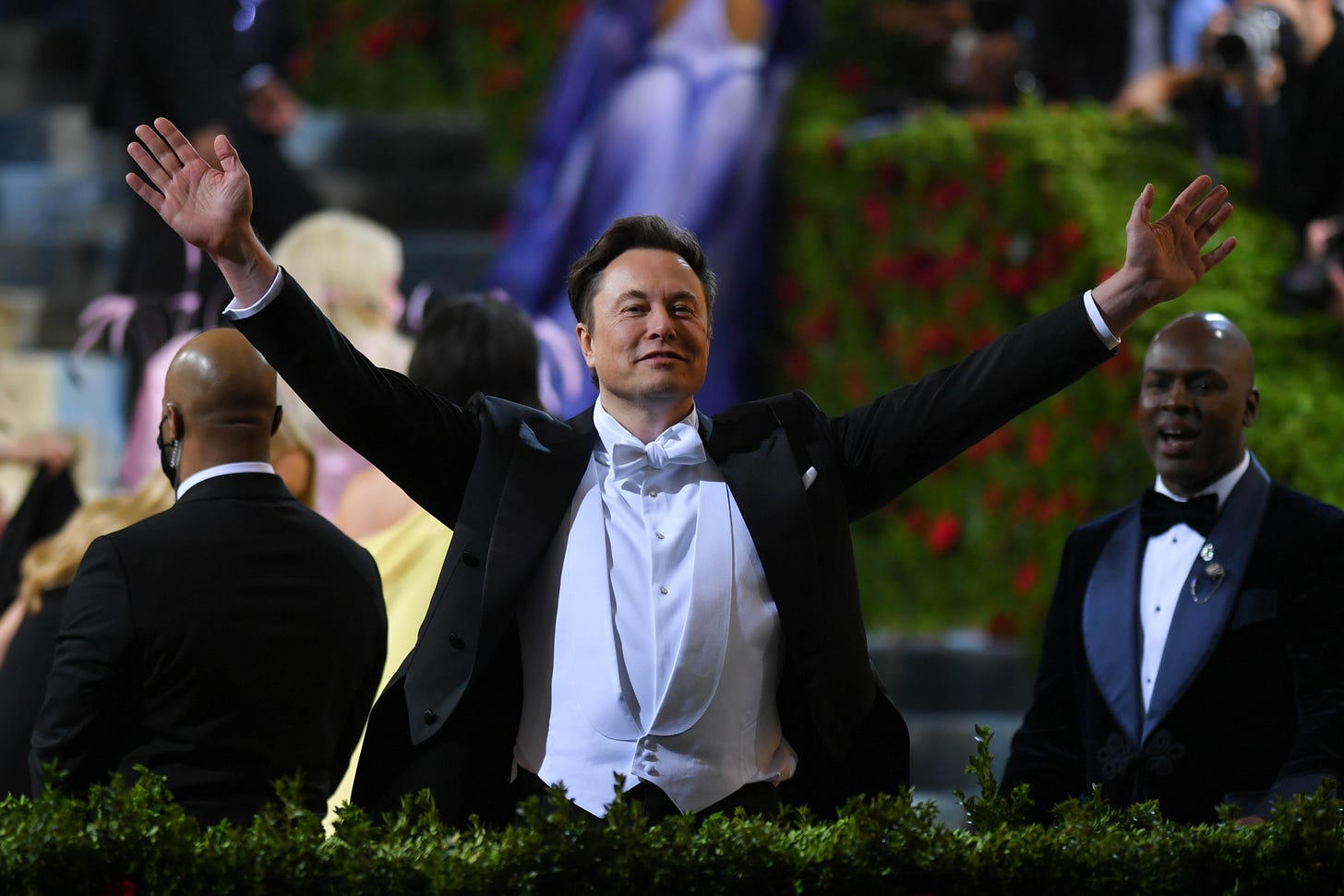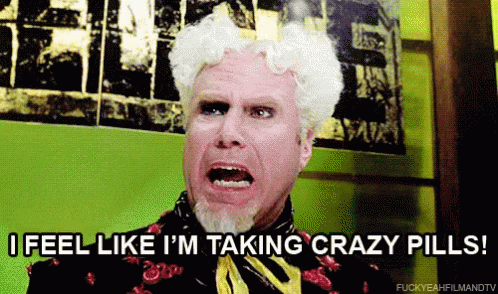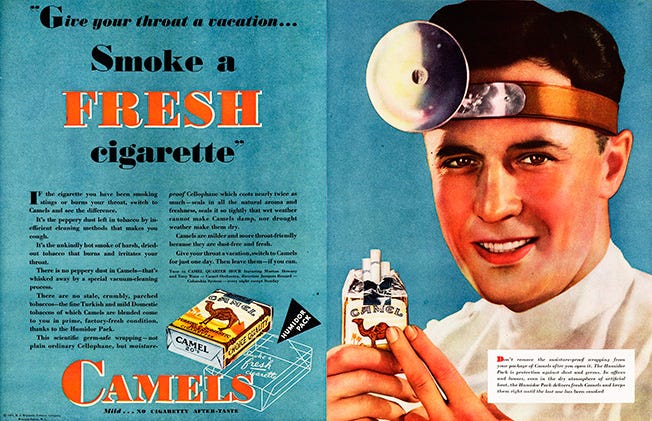Every week I highlight three newsletters that are worth your time.
If you find value in this project, do two things for me: (1) hit the Like button, and (2) share this with someone.
Most of what we do in Bulwark+ is only for our members, but this email will always be open to everyone. To get it each week, sign up for free here. (Just choose the free option at the bottom.)
1. Elon Musk Is Scofflaw
Elon Musk is despicable not because of his politics, but because he runs around insisting that neither rules nor laws apply to him. Or maybe it’s more accurate to say that he’s despicable because he’s right. Here’s Matt Levine explaining that Musk’s complaint about Twitter’s bot problem is bs:
I think it is important to be clear here that Musk is lying. The spam bots are not why he is backing away from the deal, as you can tell from the fact that the spam bots are why he did the deal. He has produced no evidence at all that Twitter’s estimates are wrong, and certainly not that they are materially wrong or made in bad faith. (Musk can only get out of the deal if Twitter's filings are wrong in a way that would cause a “material adverse effect” on Twitter, which is vanishingly unlikely.) His own supposed methodology for counting spam bots is laughable. Yesterday Twitter’s chief executive officer, Parag Agrawal, tweeted a thread explaining in general terms how Twitter estimates that fake accounts represent fewer than 5% of its count of active users, and how this analysis can’t be easily replicated by outsiders (because they don’t know which accounts are real, and also because they don’t know which accounts Twitter counts as daily active users). It seems clear that Agrawal’s thoughtful answer is basically correct.[1] Musk responded with a poop emoji.
What has happened in the last three weeks? Well, the prices of tech stocks have gone down, making the $54.20 price that Musk agreed to look a bit rich. (Snap Inc., a social-media competitor to Twitter, is down more than 30% since Musk made his offer on April 13.) And the price of Tesla Inc. stock, which he is relying on to finance part of the purchase price, has also gone down, making him poorer and making the $54.20 price look even more expensive. (Tesla is down almost 30% since he made his offer.) . . .
So he is pretending that he wants to reprice the deal for other reasons. He is not pretending very hard — the poop emoji is not going to hold up in court! — but he’s doing enough to confuse the public and give his fans a pretext to believe that he is really the victim here.
But it’s not just the lying!
After Musk announced that he had taken a 9% stake in Twitter, but before he offered to buy the company, he signed a standstill agreement under which he would join Twitter board’s board of directors and promise not to buy more than 14.9% of the stock. Four days later he tore up that agreement; then he made his bid. . . .
Twitter accepted Musk’s offer, and three weeks later, he said “ha no I was kidding, psych!” And it is catastrophic.
What can Twitter do about it? Certainly they can walk Musk through their methodology and give him evidence that spam accounts represent fewer than 5% of monetizable daily active users, but what good will that do? He doesn’t care, he’s lying about this, and no evidence that they can give him will have any effect. Twitter could get all 229 million of its monetizable daily active users in a room and have them say “hello Elon, we are real,” and that would not convince him, because he does not want to be convinced. He wants to pay a lower price.
Or Twitter can do what he actually wants, which is renegotiate the deal at a lower price. But what good will that do? What does Twitter get from signing a new merger agreement with him at, say, $42 per share? He has not lived up to any of his agreements with Twitter — the standstill, the non-disparagement clause of the merger agreement, apparently a nondisclosure agreement, the merger agreement itself — and he’s not going to live up to a repriced merger agreement unless he feels like it. An agreement with Elon Musk is worthless, as Twitter has learned over and over again.
Or Twitter can try to hold him to the terms of his current deal, but that is also risky. The way the merger agreement works is that Musk’s damages are capped at a $1 billion reverse termination fee: If he walks away and Twitter sues for damages, it can’t get more than $1 billion, or about $1.30 per share, which is nowhere close to enough to compensate for losing this deal.
The agreement does, however, allow Twitter to sue for “specific performance,” meaning that it can go to a Delaware court and ask a judge to order Musk to close the deal (and fund his $27.5 billion equity commitment). But this is tough and there is no guarantee it will work. . . . It is bad, for the rule of law generally and for confidence in Delaware corporate law in particular, if Musk blatantly ignores a merger agreement and a judge lets him get away with it. But it’s even worse if a court orders him to close and he ignores the order. Musk has a history of ignoring court orders and getting away with it.
AARRRGGGGGGHHHHHHHHH.
If you are a black woman walking across your front yard a cop can tackle you, rip your clothes off, pin you to the ground, and then lie up and down about the incident even though there’s video evidence proving his lies. And you, the citizen, get bupkiss. Maybe the judge eventually dismisses the charges against you, but that’s it.
If you’re Elon Musk, you just violate law after law after law and the enforcement arm of the federal government goes,
I don’t care what Musk’s politics are. I care about this:
Twitter calmly filed the preliminary proxy statement for its deal with Musk, a key step toward getting shareholder approval. In general, the most interesting part of a merger proxy is the “Background of the Merger” section, which describes in detail how the deal was negotiated and what the board of directors was thinking, and that is true here.
One fun thing to do with this proxy is to go through it and count how many times Musk violated US securities laws in his efforts to buy Twitter. . . .
Musk started buying Twitter stock in late January, and crossed over 5% on March 14. Under the securities laws, he had 10 days — until March 24 — to disclose this fact publicly. In fact he waited until April 4, disclosing his stake 11 days late. During this period — when he was legally required to disclose his Twitter stake, but had not — he (1) kept buying more stock and (2) had discussions with Twitter’s board of directors about taking over the company. That seems like it would have been material information, for the people who were selling him the stock!
Then, when he finally did disclose his stake on April 4, he did it on a form (Schedule 13G) that is limited to passive investors, checking a box indicating that he had “not acquired the securities with any purpose, or with the effect, of changing or influencing the control of the issuer.” Again, he was already in discussions about taking over Twitter or joining its board. He was very much not eligible to use Schedule 13G, and by using 13G — and representing he had no plans to influence the company’s control — he was lying to the US Securities and Exchange Commission and the market.
Then Musk negotiated a board seat and standstill with Twitter, which was made public; he filed a Schedule 13D, belatedly but accurately indicating that he was going to be an active investor. The 13D said that, while he was keeping his options open, he had “no present plans or intentions” to take Twitter private. A few days later he decided to scrap the standstill agreement and buy Twitter instead; again from the merger proxy’s background section:
“On April 9, 2022, before Mr. Musk’s appointment to the Twitter Board became effective, Mr. Musk notified Messrs. Taylor and Agrawal that he would not be joining the Twitter Board and would be making an offer to take Twitter private. Mr. Agrawal informed the members of the Twitter Board of Mr. Musk’s communication.”
That was a Saturday; that Monday, Musk filed an amended Schedule 13D announcing that he was not joining the board. This 13D said that he “might engage in discussions with the Board” about “potential business combinations,” but neglected to mention that he had already told Twitter he would be making an offer.
I don’t know; it all seems bad. The SEC is supposedly “investigating” Musk’s disclosure failures in this deal, and I suppose these admissions will help with the investigation, but what can they do about it? Fine him? He's so rich. Prevent him from buying Twitter? That’s what he wants! Ban him from running a public company? That is probably more drastic than the SEC (or a judge) could stomach . . .
Read the whole thing and subscribe to Matt Levine because he writes the best newsletter anywhere on the internet.
2. War on the Rocks
This monster piece delves into understanding how NATO and Ukraine have shared intelligence and what this partnership has meant on the battlefield—and how Russia’s intelligence failures have hurt its campaign:
The Ukrainian government and armed forces have proven highly adept at capitalizing on the intelligence failures of Russia, leveraged by intelligence expertise of their own. This results from eight years of experience in Donbas, and more recent training using NATO standards, in which highly integrated and technologically sophisticated intelligence, surveillance, and reconnaissance take a central role in doctrine. . . .
In March, the intelligence arm of Ukraine’s defense ministry broadcast what it claimed to be an intercepted phone call between two FSB officers discussing the death of Maj. Gen. Vitaly Gerasimov, chief of staff of the 41st Army, along with several other officers. The claim was later verified by Bellingcat. “While Ukrainian forces may be numerically inferior on the battlefield,” according to one report by the RUSI think-tank, Russia’s poor communications have given the Ukrainians the signals intelligence edge: “By detecting and locating sources of RuAF [Russian armed forces] radio transmissions, Ukrainian forces can find, fix and engage the enemy kinetically and/or electronically.”
Exacerbating this problem has been Russia’s complete failure to implement even elementary security measures. Counter-intelligence, surveillance, and reconnaissance provides commanders with an awareness of the capabilities being deployed against them by their adversaries. This in turn informs the operational security and deception measures vital to achieving freedom to maneuver and avoiding interception or pre-emption by a better-informed opponent. Russia and outsiders both have long perceived the Russian superiority in denial and deception. We even use their term, maskirovka. Now, their only successful deception appears to have been self-directed, a reflection of their poorly executed “correlation of forces and means” analysis. The result has been the death of many commanders, including, at the time of writing, nine general officers and more than 30 colonels. While generals have never been immune to enemy fire, the issues of command and control in the Russian army — especially the need to push forward stalled operations — are likely contributing to their unusually rapid demise in Ukraine. The degradation of staff and command officers is certainly multiplying Russia’s problems in its campaign and poses a long-term challenge for recovery. . . .
Two main factors can be identified in Ukraine’s ability to maintain the upper hand on the operational intelligence front: the willingness of Western allies to share intelligence, and the increased power and potential of open source intelligence. The rapid drop in space launch costs have allowed a proliferation of civilian, high-resolution Earth observation systems that rival the very high-cost national “spy satellite” systems of a decade ago. These commercial systems offer sometimes nearly continuous, multi- and hyperspectral imaging, including cloud-penetrating radar. National geospatial intelligence agencies have made use of this civil satellite capacity, which has increased not only their coverage and efficiency, but also made it possible to present imagery intelligence analysis openly or at low levels of classification. . . .
What has also become clear, however, is how significant the Ukrainian population has become as a “sensor” for providing intelligence on Russian troops. In part because of their assessment that the population would welcome them, the Russian forces took little action to secure their movements from the local Ukrainian population. But very quickly, these citizens and their mobile phones have turned into a gigantic, distributed, open source sensor network. Mykhailo Fedorov, Ukraine’s minister of digital transformation, said in an interview with The Washington Post that crowd-sourced open source intelligence is crucial for his country to the extent that the Ukrainian government public services app, Diia, allows citizens to post geotagged pictures and videos of Russian troop movements. The Diia app “in wartime is not just e-documents and identification of citizens at checkpoints. Now it is also the opportunity to […] report on the movement of the enemy’s military troops and hardware […] It is also the possibility of imagining yourself as a Bayraktar operator.” Fedorov has noted they receive tens of thousands of reports each day and that they are “very, very useful.”
Read the whole thing. We’re witnessing a revolution.
3. Every
This Almanack post about Oatly by Nat Eliason is worth the price of admission just for the deep-dive on the amazing shameless of 20th century ad campaigns:
The sugar industry didn’t invent this strategy. It was used by the tobacco industry starting in the 1930s to convince people that cigarettes were fine. Even your doctor uses them:
. . . And if you blow Tipalet smoke in people’s faces, they’ll want to sleep with you. Not sure how they did this study:
. . . The playbook, outlined in detail in Merchants of Doubt, is very simple:
Obscure the Truth: Make vague health claims that aren’t falsifiable. “Give your throat a vacation… smoke a fresh cigarette” sounds like they’re saying “this is definitely healthy,” but they’ve really said nothing.
Create Confusion: Fund massive amounts of research papers showing the harmful ingredients are healthy, or at least not provably harmful. Then cherry-pick or p-hack research into meta-analyses that support your industry. The sugar industry did this throughout the 1950s-1970s to point the finger at fat and cholesterol. The tobacco industry did this extensively as well.
Strawman the Disagreements: When people criticize the ingredients or health claims, strawman their arguments by focusing on the most easily dismissed criticisms, or by pointing the finger elsewhere. Sugar convinced people dietary fat was a bigger problem, or that not enough exercise was the culprit for obesity.
And when all else fails, use sexy lifestyle marketing to keep promoting the product.
Read the whole thing and remember the bad old days.
If you find this newsletter valuable, please hit the like button and share it with a friend. And if you want to get the Newsletter of Newsletters every week, sign up below. It’s free.
But if you’d like to get everything from Bulwark+ and be part of the conversation, too, you can do the paid version.










Levine is a good writer, no doubt about it, but suggesting that Musk doesn't think himself subject to the rule of law doesn't reflect any deep analysis, just a look around. The former president of the US, on national TV, fomented an insurrectionist riot and is regarded as the leading GOP contender in '24. Members of Congress document their violation of their own rules on stock trading and keep getting re-elected without accountability. The head of the FDA refuses to answer Congressional questions about the agency's failures relative to baby formula and then heads back to work instead of to the unemployment line. Members of Congress and others no longer in office ignore or publicly refuse to comply with subpoenas from the Jan. 6 committee and there are no consequences. Why should the notionally richest man in the world think he should comply with inconvenient laws?
No need to hold Musk accountable. I'm sure he's really sorry and he's learned his lesson, just ask Susan Collins.